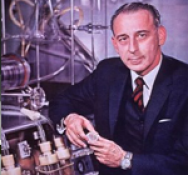Dr. Charles A. Hufnagel, Professor of Surgery at Georgetown University, is one of America's most gifted surgeons and a pioneer in the surgical treatment of heart and great vessel disorders.
Dr. Charles A. Hufnagel - 1965

He is a native of Louisville, Ky., where he grew up in an atmosphere of science: his father, Dr. Charles J. Hufnagel, was a physician.
Villanova University's 1965 Mendel Medalist attended the University of Notre Dame, from which he was graduated with the Bachelor of Science degree. In 1941 he received his Medical degree at Harvard.
Dr. Hufnagel began his surgical career in 1942, when he was appointed House Officer in Surgery at Peter Bent Brigham Hospital and Boston Children's Hospital. He continued his association with Peter Bent Brigham Hospital and Harvard's Medical School until 1950, when he was appointed Professor of Surgical Research and Director of the Experimental Laboratory at Georgetown.
During the past twenty years, Dr. Hufnagel has distinguished himself as a scientist and surgeon. Shortly after World War II he made the first successful graft of a rigid tube, fashioned from lucite, in a blood vessel. In 1952 he performed the first successful insertion of a plastic valve in a human heart. It demonstrated for the first time the possibility of a functionally moving artifical body part. Further experiments have demonstrated a safe method for prolonged cardiac arrest which permits the placing in its normal position of an aortic valve prosthesis.
Dr. Hufnagel, 47, has performed countless operations in which portions of diseased arteries are replaced with plastic substitutes. He and his surgical team have developed a new heart and lung pump for open heart surgery and a heat exchanger by which the blood of the patient can be heated or cooled. Surgical techniques developed by Villanova University's Mendel Medal winner are in use throughout the world and his contributions have greatly influenced the progress of medicine. In addition, his rare skills as a surgeon have given precious added years of life to persons seriously crippled by diseases of the heart and blood vessels.
In 1961 Dr. Hufnagel was named by his medical colleagues as one of ten leaders of American medicine. He was the only surgeon among the group.
Dr. Hufnagel and his wife, the former Katherine Moulton, have two daughters, Katherine Lucina, 20, and Judith Ann, 16. He is a member of more than a dozen medical societies, groups or committees engaged in promoting the forward march of the healing art.
Mendel Medal Presentation Program, May 24, 1965. Villanova University, Villanova, Pennsylvania.
Dr. Charles A. Hufnagel, Professor of Surgery at Georgetown University, is one of America's most gifted surgeons and a pioneer in the surgical treatment of heart and great vessel disorders.
He is a native of Louisville, Ky., where he grew up in an atmosphere of science: his father, Dr. Charles J. Hufnagel, was a physician.
Villanova University's 1965 Mendel Medalist attended the University of Notre Dame, from which he was graduated with the Bachelor of Science degree. In 1941 he received his Medical degree at Harvard.
Dr. Hufnagel began his surgical career in 1942, when he was appointed House Officer in Surgery at Peter Bent Brigham Hospital and Boston Children's Hospital. He continued his association with Peter Bent Brigham Hospital and Harvard's Medical School until 1950, when he was appointed Professor of Surgical Research and Director of the Experimental Laboratory at Georgetown.
During the past twenty years, Dr. Hufnagel has distinguished himself as a scientist and surgeon. Shortly after World War II he made the first successful graft of a rigid tube, fashioned from lucite, in a blood vessel. In 1952 he performed the first successful insertion of a plastic valve in a human heart. It demonstrated for the first time the possibility of a functionally moving artifical body part. Further experiments have demonstrated a safe method for prolonged cardiac arrest which permits the placing in its normal position of an aortic valve prosthesis.
Dr. Hufnagel, 47, has performed countless operations in which portions of diseased arteries are replaced with plastic substitutes. He and his surgical team have developed a new heart and lung pump for open heart surgery and a heat exchanger by which the blood of the patient can be heated or cooled. Surgical techniques developed by Villanova University's Mendel Medal winner are in use throughout the world and his contributions have greatly influenced the progress of medicine. In addition, his rare skills as a surgeon have given precious added years of life to persons seriously crippled by diseases of the heart and blood vessels.
In 1961 Dr. Hufnagel was named by his medical colleagues as one of ten leaders of American medicine. He was the only surgeon among the group.
Dr. Hufnagel and his wife, the former Katherine Moulton, have two daughters, Katherine Lucina, 20, and Judith Ann, 16. He is a member of more than a dozen medical societies, groups or committees engaged in promoting the forward march of the healing art.
Mendel Medal Presentation Program, May 24, 1965. Villanova University, Villanova, Pennsylvania.

